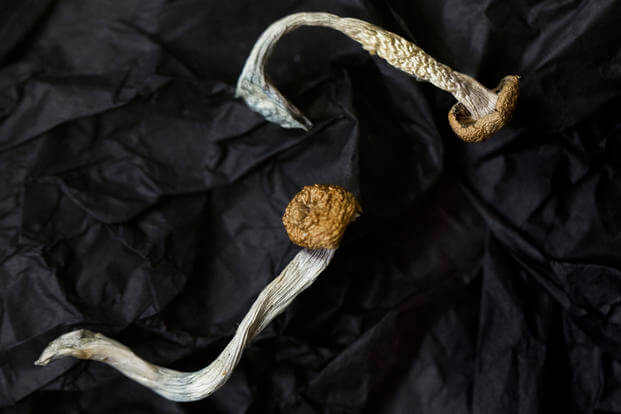U.S. service members may be drug-tested for suspected use of “magic mushrooms” under a new policy announced by the Pentagon last week.
A memo issued Aug. 18 by the Office of the Under Secretary of Defense for Personnel and Readiness said that, starting Oct. 1, troops may be screened for psilocin, the hallucinogen in psilocybin mushrooms.
Psilocybe cubensis, aka “magic mushrooms” or “shrooms,” have been used as a recreational psychedelic drug for decades in the U.S. but remain a Schedule I substance under federal law, meaning they have been classified as having a high potential for abuse, have no official accepted use, and are illegal.
Read Next: Trump Says Space Command Is Moving to Alabama, Reversing a Biden-Era Decision
But in recent years, the fungi have drawn interest for their potential as a treatment for mental health conditions, including post-traumatic stress disorder, anxiety and depression. Seven states now allow research on their potential use as a medical treatment, and two — Colorado and Oregon — have decriminalized their possession, according to the substance abuse treatment nonprofit organization Recovered.
Usage of psilocybin also has increased across the U.S. in the past six years: Roughly 12% of Americans reported in 2023 that they had consumed the mushrooms at least once in their life, compared with 10% in 2019. Microdosing – the practice of taking small amounts to self-medicate for a mental health issue — also is on the rise, with roughly half of those who tried psilocybin in the past year choosing to use a small dose, according to a 2024 study by Rand Corp.
Under the new policy, the Pentagon’s Drug Demand Reduction Program will now include screening for psilocin use to prevent any “impairment and subsequent deterioration of security, military fitness, military readiness, and good order and discipline” posed by the drug.
“Drug abuse by service members is a safety and readiness issue, and the department must adapt our detection and deterrence program to address new and emerging drug threats,” wrote Dr. Merlynn Carson, who is currently serving as deputy under secretary of defense for personnel and readiness, in the memo to the services’ assistant secretaries for manpower and reserve affairs and the National Guard Bureau.
Under the program, commanders will be able to request a specific test for psilocin for probable cause, by consent or for a specific order. The Defense Department also may randomly test specimens submitted under its drug testing program.
Psilocin can be detected in a urine or blood sample, but it leaves the body relatively quickly. According to the group American Substance Abuse Professionals, the compounds may not be detectable in urine after 24 hours. They may remain in the bloodstream for up to 24 hours and are detectable in hair follicles for up to 90 days.
False positives are rare, according to many drug treatment centers, with the likelihood of a false positive occurring as a result of cross-reactivity with another hallucinogen, such as LSD.
Meanwhile, the military services, Defense Department and Department of Veterans Affairs are studying the substance’s potential as a medical treatment.
The Army announced in 2024 that it was seeking small “proof-of-concept trials” to demonstrate the feasibility of larger-scale studies on psychedelics as medical research.
The fiscal 2024 National Defense Authorization Act directed the Defense Department to establish a process for funding studies that included the use of psychedelic drugs, including psilocybin, to treat mental health conditions.
Under the law, any member of the military diagnosed with PTSD or traumatic brain injury was permitted to take part in any of the Pentagon-funded studies.
Pentagon-funded medical research remains the only viable opportunity for troops to use magic mushrooms. In 2023, an Air Force Academy cadet learned the hard way that he could not consume shrooms in Colorado.
During a special court-martial in which he was charged with one violation of the Uniform Code of Military Justice, Seth Misukanis received a reprimand for violating federal law and agreed to leave the academy.
The VA has a dozen studies underway, according to VA Secretary Doug Collins.
“We’re already seeing some great results. And that’s what’s kept us to push for more as we go forward,” Collins said during an interview with DC News Now.
Although psychedelic substances are listed as Schedule 1 drugs by the Drug Enforcement Agency, the VA received waivers to support its studies and has conducted research funded with private donations rather than federal money.
Related: Air Force’s Marijuana Waiver Program Proves More Popular Among Applicants Than Expected
Story Continues
Read the full article here





